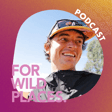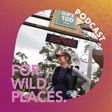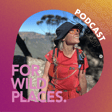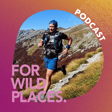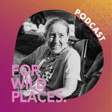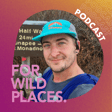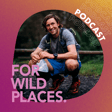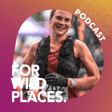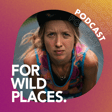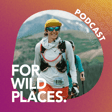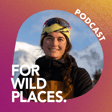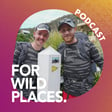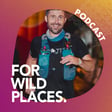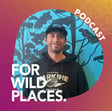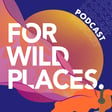Become a Creator today!Start creating today - Share your story with the world!
Start for free
00:00:00
00:00:01

4. Mountain running, team USA and loving your local trails with Michelle Merlis
US mountain runner Michelle Merlis joins us to talk about motivation, moving in the mountains and managing the balance between training and work.
We then checked in with Michelle two years later to hear how the transition into full-time athlete life is treating her, including moving house, international travel and sharing her trails with friendly black bears.
You can find out more about Michelle on Instagram, or via her website.
To hear more from For Wild Places, follow us on Instagram, subscribe to our newsletter or become a member.
Transcript
Introduction to 'For Wild Places' Podcast
00:00:20
Speaker
Welcome to the For Wild Places podcast, a podcast that shares the stories of inspiring people and their adventures in running, advocacy and adventure. I'm your host, Hilary.
Meet Michelle Merlis: From Basketball to Trail Running
00:00:30
Speaker
Today, we are excited to bring you our trail chat with US mountain runner, Michelle Merlis.
00:00:34
Speaker
Every month we catch up with athletes, leaders, activists, and inspiring people to talk about past or future adventures, their favorite wild place, and the connection between adventure and activism. The first part of this conversation was recorded in October 2022 in the midst of a hectic training block before Michelle was due to join Team USA at the World Mountain and Trail Running Championships in Thailand.
00:00:55
Speaker
We then checked in with Michelle roughly a year and a half later to hear how Thailand training, travel and life in general has been treating her. Before we jump into the chat, I would like to acknowledge the First Nations people who have been custodians of land, waters and culture for tens of thousands of years.
00:01:09
Speaker
We understand the wild places we love to explore on this continent have been cared for by First Nations people for millennia. We seek to learn from the world's oldest living culture so we too can care for country, as the Indigenous people of this continent have done since time immemorial.
00:01:23
Speaker
This podcast was recorded and edited on Watarang Country in so-called Australia, where sovereignty was never ceded.
Michelle's Trail Running Journey and Experiences
00:01:30
Speaker
This always was, and always will be, Aboriginal land. In 2022, Between Will and Michelle covers Michelle's transition from basketball to trails, the economics of energy, and her ever-growing love of trail running.
00:01:42
Speaker
Michelle grew up in the picturesque Catskill Mountains of New York State, and she has always felt at home amongst the rocks and ridges of the mountains. Michelle's recent trail adventures have taken her across the US and around the world, honing her skills and experience in moving fast over the most technical terrain on offer.
00:01:58
Speaker
Following on from our conversation in October 2022, I checked in with Michelle in June 24 to hear what's been keeping her busy and how the work and training balance has been treating her.
00:02:08
Speaker
Without any further ado, let's get into the chat with Michelle and Will from October 2022.
00:02:17
Speaker
Welcome everybody to For Wild Places sixth trail chat. um My name is Will. I'm based in Port Kembla on Darawa land, which is the south coast of New
Training and Preparation for World Championships
00:02:29
Speaker
South Wales.
00:02:29
Speaker
Today we are stoked to have as our special guest, ultra runner, mountain runner, coach, economist, Team USA legend.
00:02:42
Speaker
I'm sure I've forgotten a bunch of other things, but welcome, Michelle Merlis. How are you, Michelle? Hi, I'm doing well. Thank you so much for having me on. This is such a cool format to do an interview with guests here. And I can't wait to chat and answer everyone's questions.
00:03:02
Speaker
Awesome. Look, i don't know about you other guys, but I follow Michelle on Strava. And um actually, Michelle mentioned before as well, she's I love the photos. There's also some scary videos of tarantulas if you want to get into that kind of thing. But the runs look super amazing. i'm always really jealous.
00:03:20
Speaker
So Flagstaff, is it Coconino National Forest? Yeah, Coconino. It's Coconino County. So a lot of things around here have the name Coconino. Coconino. Awesome.
00:03:31
Speaker
So because youre you're a New Yorker, Michelle, I just wanted to check in. Are you are you now living in Arizona or you just training over there? Like like what have you been up to? Yeah. What's what's happening? withre Great question. So, yes, I am actually based in Albany, New York, which is about three hours north of New York City, for reference.
00:03:53
Speaker
And that is where i mostly live. But ahead of the world championships in Thailand, I wanted a unique training experience and um Had a couple of options of places to go to train.
00:04:11
Speaker
was looking for something with altitude, with really good trail access, um looking for mountains that were a little bit bigger, just based on the profile of the race that I'll be doing in Thailand.
00:04:24
Speaker
And I've been to Flagstaff a couple of other times for training trips. And so kind of made this my pick. And I've been here for four weeks now. i have a couple of days left, actually. And then I head back to New York for a week before I go to Thailand.
00:04:40
Speaker
So I am just out here training. It's been really fantastic. So you're obviously not working. you' You've taken time off work. Yeah, that's the other thing I'm really fortunate to have on my side is that um I kind of took a little bit of a risk with my employer and ask for some time off to train and then do this race in Thailand and then be on vacation in Thailand afterwards.
00:05:05
Speaker
um So i am currently on 10 weeks of leave from my job, um which I will... go back to when I'm finished with the race in the middle of November.
00:05:17
Speaker
But I, yeah as you mentioned in the intro, I am an economist um and I do have a job that is outside of running. yeah Just not right now. so I'd i'd love to love to come back to Thailand um a bit later, but what's your training plan looking like? Because you're your event, it will be a 40K event, yeah? Correct, yeah. How are you approaching training? Like what um like what what's the buildup? What what are the targets? what are the milestones? Yeah, so i actually just had my peak week last week.
00:05:48
Speaker
um This week will still be a bit of a bigger week. What that looks like, I usually run six days a week, take rest days on Mondays. ah It's a pretty standard thing for the people who work with the person I'm coached by.
00:06:04
Speaker
We usually rest on Mondays and then the rest of the week is some play and some hard work. So for that peak week, usually have one or two speed sessions per week out here. Most of those sessions have been hill workouts.
00:06:21
Speaker
So I had a pretty burly hill workout last Tuesday. And then Thursday did kind of an uphill tempo for about half of my run. And then just long runs on the weekend, trying to get in some vert.
00:06:33
Speaker
I've been trying to train a bit specific to the race. So the race in Thailand is pretty much unlike any race I've ever run before at that distance. So in New York and the other races that I've run around the U.S.,
00:06:48
Speaker
Pretty much they will go up and down and up and down and you have some climbs. But the race there, that 40K has some really substantial climbs, like 5K climbs with several thousand feet. I should have looked up the meters conversion.
00:07:05
Speaker
ah Sorry. that's Like divide by three or else. Right. Yeah. Yeah. So pretty, pretty sustained and I'm just, I've never done anything like that in training. So I've been doing a lot of that out here. So a lot of my runs, I might cover K's 25 K in a run and it will be one uphill and one downhill. And that's part of the reason why I came out here to Flagstaff is because they have peaks that are big enough to do that.
00:07:34
Speaker
Um, one of the great places to do that is the grand Canyon, which kind of in reverse where you actually run downhill for several thousand feet before coming back up. But I got to do that last Saturday and that was, that was really special. Yeah. So just, uh, a lot of running on trails with incline and decline, some steep hiking sections.
00:07:58
Speaker
But in general, I've been doing higher mileage than I'm used to quite as much vertical gain as I've done in the past. I think the East Coast gives you a lot of vertical where you will do this, everything on the East Coast, just as straight uphill, straight downhill, straight uphill, if anyone's ever run on the East coast of the U S before pretty brutal. It's really rocky, really gnarly terrain. Um, out here, everything's a bit more runnable. so it's been a pretty unique, uh, stimulus for me. It's training that I've really never done before. So I'm pretty excited to see where that takes me in the upcoming race. And then just even for like my future running to do something new.
00:08:41
Speaker
Um, I think it's just adding to the toolkit and I'm excited about it. Yeah, awesome. But you'd be feeling pretty good, wouldn't you? Like elevation,
Challenges and Strategies for Racing in Thailand
00:08:49
Speaker
vertical, that that's that's a strength of yours. Like you'd be feeling pretty confident. um Yeah?
00:08:54
Speaker
Yeah, I think so. Um, I think that my strength is really running down steep terrain. I've always struggled a bit more with the uphill running, um, especially anything when it's not running and it turns more to hiking.
00:09:10
Speaker
Um, so anything that's really steep, that's definitely my trail weakness. Um, and I've been working really hard to address that. It's just, uh, Perhaps some of you have experienced this before that we don't necessarily like to do the things that we're bad at or that are more painful.
00:09:29
Speaker
So we avoid them. And I definitely have done a lot of avoiding steep uphills, yeah um but I will take a downhill any day. Nice. I should just say, I broke my own rule about not talking about Thailand and and training because it's very interesting. But um just in case folks weren't aware, so Michelle won the Breakneck Point Trail Marathon earlier in the year, qualified to represent the US at the World Mountain and Trail Running Championships, the 40K event coming up in Thailand. That's next month, yeah?
00:09:59
Speaker
Yes, it is in two and half weeks, right at the beginning of the Awesome. Hey, are you are you are you thinking about, like I've actually, I've been to Thailand once, but i'm not in a running capacity. I was just holidaying. But are you worried about like climate, humidity, anything like that?
00:10:15
Speaker
Yeah, definitely. i think I'll, I know what I'm getting into. So the East coast of the U S again, New York, where i live is ah humid climate in the summer.
00:10:27
Speaker
So we have that humidity, probably not as extreme as it can be in Thailand, where some of the days I've looked at the weather and it just says like 99% humidity. It's not raining. So um I am ready for what's coming. I think that running in humidity is really challenging.
00:10:47
Speaker
And of course, I'm out here training in the desert with absolutely no humidity. But part of my training outside of running, I'm doing a lot of other things. So strength training, a lot of mobility work, plyos, and I'm also sitting in a sauna.
00:11:03
Speaker
four to five times a week. So I'll do my run and then I'll hit a ah really hot sauna for 15 to 20 minutes. And I'm just going to hope I've done the best I can to be prepared for that heat and humidity, but it will be a factor and it'll be a factor for everybody.
00:11:20
Speaker
i can't, I don't know anyone who really runs well in humidity. So it'll be interesting to see how it plays out. Massive congrats on, on qualifying. That's, that's pretty amazing. Thank you. Yes. I still am not sure it's real. So I guess I'll feel like it's real when I'm on the start line.
00:11:39
Speaker
Yeah. And look, i can't promise that we'll be going for Team USA, but we'll definitely be going for you. Okay. Thank you. ah Yes. You have your own country to cheer for over there. I understand that.
00:11:51
Speaker
i I found out that you're a basketballer and that got me very excited because my first sport was basketball as well. And they're just, yeah I feel like you couldn't get two more different sports. Like you've got team sport, individual sport, like the movements are really different. The surfaces are obviously really different.
00:12:08
Speaker
um I just wanted to ask you, what what made you make the switch from a basketballer to to a runner? Yeah, I think the the end of basketball for basketball kind of the the typical experience, right? You can play basketball in middle school, high school, college. And then after college, maybe you find a league to play in, but really the organized portion of it is over.
00:12:32
Speaker
so when I graduated from college, I played a little bit in college, not... um I didn't play on our varsity team, but I played on our JV team and I did intramurals and stuff like that just because I loved it so much.
00:12:44
Speaker
And when I graduated and then i I went straight from undergrad to graduate school, I had this sensation of like, well, what do I what do i do now? I've always been really active.
00:12:56
Speaker
i played basketball for a really long time. i think from about the time I was in fourth or fifth grade through college, And I did run two years of track in high school.
00:13:06
Speaker
But to be honest, I don't remember running much. I remember spending a lot of time hanging out with my friends on the side of the track, trying to avoid running. It worked out. I think that um running was a really accessible thing to do while I was in graduate school.
00:13:24
Speaker
it provided that stress relief. It provided the physical activity. And I just did it very casually. Actually, when I was in undergrad, one of the guys that I had dated he was out of school and all of his friends were runners. And that's how they met each other was through a running group.
00:13:43
Speaker
And so he really is the one who like... instilled that idea that you can make friends in your adult life by running and you just show up at a track and run with them. And that, I mean, that changed my life because when I went to graduate school, that's what I met people through running. When I moved to Albany where I live now that's how I met like 90% of my friends. That's how I met my husband. so it just was amazing.
00:14:07
Speaker
I don't know. It just fell into place, I guess. i was very casual at first. And then really when I moved to New York a couple of years later and joined the... It's called the Albany Running Exchange, which is the running club that my husband started when he was in college.
00:14:22
Speaker
That's when I became a little bit more serious and... I started running year round. That was ah the next step. But you're right. From basketball to running, it doesn't necessarily make sense.
00:14:33
Speaker
But I think kind of going back through my childhood, i spent a lot of time hiking with my parents and my brother. we grew up in the Catskill Mountains, which are... They're very small mountains in the the kind of a little bit south of Albany in New York.
00:14:49
Speaker
So I was really comfortable being outdoors and being on trails. And I always loved the running aspect of basketball. I was always the fastest person when we were sprinting or when we had to do a warm-up before practice. Like i i live for the running. I even think I told my coach when I graduated from high school, you should make the players run more. Yeah.
00:15:08
Speaker
So it was always there. um it just took a little while for me to really get into it. Wow, but you probably weren't the most popular teammate. No, people didn't love that. now It's funny, I think all of the defensive drills you would have done, like side to side, like strong quads are obviously going to help you on the downhill run. So that there's theres a source some there's also some positives there. Yeah, ah kind of thinking about, you know, the the movements are really different. In some ways, that's been really helpful. Like what you just mentioned, that side to side, that lateral movement, knock on wood, I've like really never had injuries with running. And I think part of that
00:15:49
Speaker
is because I played ah a very dynamic sport that involved a lot of side to side movement. um It involved a lot of leg strength, jumping. Before I played basketball, actually was a dancer. So I guess that was like the first thing that I really did.
00:16:03
Speaker
and I think that too was really formative in that I built really strong feet, really strong legs. I I've always had really strong legs. My arms might be like little, my dad calls them my spaghetti arms because they're just tiny, but you don't need a home to run. So, so yeah, I think that those experiences of really not being a runner helped me.
00:16:26
Speaker
be the runner that i am the The quad strength is so huge for the downhill running. So I feel like i have to really try to shred my quads because they are really strong. And I am really thankful for the experiences I had in other sports to give me these different types of skills that you might not necessarily develop if you start running at a very early age. So yeah, it's been, i think everything's come together.
00:16:53
Speaker
and And I should mention there are some things that are maybe not so helpful about having been a basketball player and when it comes to my running, which is that I have a tendency to run up instead of out. So I spend a lot of energy going upward as opposed to forward. But I'm working on that. i'm trying to become a more efficient runner in the the forward direction.
00:17:14
Speaker
Yeah, I
Balancing Running with a Professional Career
00:17:15
Speaker
have horrible form. I'm really bouncy because I spent my time trying to jump high. Yeah. But I'm just a casual runner, so doesn't matter. But yeah, if you hit elite, yeah, I'm just going doing, doing, doing and wasting all this energy. Yeah.
00:17:29
Speaker
It's just in you. You got to just jumping all the time. It's fun. Yeah. So, hey, Michelle, in normal time, so you're an economist and you work for like the the power grid in Albany, yeah? I know you're sponsored athlete now, but um yeah I was going to ask, so like, are you still, I read somewhere that you're working full time. Do you still work full time? And if you are in normal times, how do you how do you juggle that with with training and and events?
00:17:53
Speaker
Yeah, so I do work full time. My transition to working full time I don't know, it's kind of interesting. So I had been in a PhD program for economics.
00:18:06
Speaker
um I actually really wanted to be a demographer. i was really interested in climate refugees and the impact of climate on migration, human migration.
00:18:19
Speaker
I I had been in that program, but it wasn't really working out. It wasn't a really good fit for me. It was thousands of miles from my husband. um So I actually ended up leaving the program in 20 at the end of 2018.
00:18:33
Speaker
And um I thought, well, I'm just going I'm going focus on my running. that's When I transitioned to. running and coaching full time. And that was great. i it was the first time in my life where i just kind of... I was very fortunate because of the work that my husband does that I was able to do that.
00:18:54
Speaker
um Kind of go all in on my own running and my coaching business. But then the pandemic happened. Yeah. as you are all aware. So my husband puts on running races and works for other events and pretty much overnight, all his business um just vanished. So in March of 2020, realized pretty much in about two days that I needed to find a job.
00:19:22
Speaker
And so my background is in economics. I have a master's in agricultural economics. And as I like to tell people, half of a PhD, which is not really true because they don't count that.
00:19:33
Speaker
But ah they' the organization that manages New York State's power grid is actually located in the city where we live. um And I was familiar with them through my graduate studies program.
00:19:46
Speaker
And it just happened that at that time, they were hiring three economists. Somewhat suspicious when you're hiring a handful of economists at the same time, but it was just very, yeah, you're like, why did all of your economists leave? But it was just coincidence. The people that they had working there had, you know, one of them, their partner had moved, so they moved and kind of a...
00:20:10
Speaker
It wasn't like anything was fundamentally wrong with the organization. So that was, yeah, in 2020, I started that job and I have been working there full time since.
00:20:21
Speaker
And to answer your question, so 2020... twenty twenty I would say actually felt really smooth. I thought the transition to working full time, maintaining my training load and maintaining all of my coaching clients was going to be really challenging. And there were definitely some really challenging days.
00:20:41
Speaker
But I think the position that I'm in with my job, There was a lot of learning. So that first year was a little bit more flexible. i was learning a lot. um I wasn't necessarily like leading any projects or any really big initiatives. And so I kind of got to just sit back a little bit not be super stressed about work, which was helpful.
00:21:04
Speaker
I was also working from home, which made things a lot easier to just go out for a run at lunch or you know get in a run and then hop on a call and not have to worry about being really presentable.
00:21:17
Speaker
So that was really helpful. There were a lot of really tough days, though. And i think that became very clear in 2021. 2021 honestly was...
00:21:29
Speaker
It was a bit of a challenging year for me. I struggled a lot with balancing all three of those things. I did make the decision to taper off my coaching business. So...
00:21:44
Speaker
Throughout the year, I worked with all of the athletes that I'd had. um And I pretty much had a full-time coaching load too. I had about 20 athletes. So it felt like I was working two full-time jobs and trying to be ah top runner.
00:21:58
Speaker
So it it was a tough year. i would say I went from 2020 feeling like my running was at its best. I also felt like really guilty because I had...
00:22:09
Speaker
I mean, compared to a lot of the world, I'd had like a really good year. I landed a really good job. My running was going really well. My husband and I decided we were going to build a house. Like, so I had a lot of guilt about how good that year felt in a year that felt so bad for so many people.
00:22:27
Speaker
um But I got my bad year last year. So I guess I made up for it a little bit. But ending the coaching business and then finding some more flexibility with my job was really key.
00:22:37
Speaker
um My supervisor um has been really supportive. and They allowed me to have a bit more of a flexible schedule. So actually... I can work different hours. you know As long as I get my work done, I'm working my hours every week.
00:22:54
Speaker
um So that's been really nice. Like Wednesday mornings, usually the morning I do a strength workout and I do a speed session. So I usually don't start work until later in the day on Wednesday. um and that was just a huge relief. So I've had a lot of support in making it work.
00:23:09
Speaker
I think... I still struggle sometimes with not putting so much pressure on myself on both sides, um, because I do really want to be a really good runner, um, and to compete at the highest level, but I also really liked my job.
Michelle's Environmental Advocacy Journey
00:23:26
Speaker
Um, and I'm really,
00:23:28
Speaker
passionate about the things that we get to do where I work. So in some ways, the two have kind of helped each other, right? My running makes me think a lot about the environment i'm in and the challenges that we face and why my job is important. And then my job also kind of gives me this flexibility to pursue something that's ah you so important in my life. I mean, I don't know many companies that would say okay to their employee...
00:23:56
Speaker
going off the grid for 10 weeks to train for a race. So, um so yeah, I feel, I feel really lucky in the support that I have to be able to, to make it work.
00:24:07
Speaker
Oh, that's so interesting. ah I think you nailed the, um some of the contradictions and mixed feelings of this pandemic. I could certainly relate to what you're saying.
00:24:18
Speaker
I'm risking getting too much into the conversation, but um I'll open it up to other questions soon, but you just touched on, the advocacy side of things. We're obviously an activist organisation that we we love running, but we we've come together to try and advocate for and protect the wild places. And there's a lot of beautiful wild places in Australia under threat.
00:24:37
Speaker
And we need to protect them, not just for our running, but for the future of our planet at risk of sounding dramatic. ah But But you made me think, I wanted to ask you, i know you've done advocacy work in the past. Yeah, is that, has it mainly been in conjunction with your work? Or yeah, i was just going to ask you, how how have you been involved here in advocacy? Are you involved in anything now? And is there anything happening in the in the in in the area running in now, like campaigns or or anything like that?
00:25:05
Speaker
Yeah, that's a great question. so I think the first thing I'll say is that I'm always learning and I'm not perfect. And that's part of why I was so excited when you reached out to me because this was an organization that's trying to do good things for the places that we run in. And um i think there's a lot to be learned by the different things that people are doing around the US, around the world. So I'm excited to you know get ideas from what you're doing to hopefully... you know do things differently where we are.
00:25:37
Speaker
But again, to to answer your question, too many tangents, I'm sorry. ah But i think when I think back to like, when was my first like environmental thought, you know, and I think when I was in high school, they were talking about developing the ridge that sits behind where my parents live.
00:25:57
Speaker
um so it's this really beautiful ridge. It's referred to as the gunks, which is a, really popular climbing spot. Like if you Google the gunks, it'll come you know come up as one of the premier climbing locations in the US. and they wanted to put housing developments on there. And i don't know, I was a freshman in high school and heard about this for the first time. I was like,
00:26:20
Speaker
what? No, but that can't happen. and I just kind of remember like diving into It it was the first time I ever like learned about anything that was happening in my neighborhood. And I mean, as a freshman in high school, you don't have a lot of of autonomy or authority, but it was the first time that it was kind of like open to my eyes that, oh yeah, people people are interested in doing things to the places that you love that don't necessarily protect those places. it was kind of like my first taste of what it meant to learn about something environmental. And then I think my first bit of advocacy was when I was in college. I went to a school that was in a location um near the Marcellus Shale, which is this shale bed that was being fracked in the U.S.,
00:27:09
Speaker
It's so wild to me because when I went to school, I wanted to go into the fashion industry. And now i know I want to be as far away from the fashion industry as possible. but but um But I think through the courses that I took, and I think that's what's so great about the I went to a liberal arts college and i really got exposed to a lot of different things. And one of those things was like how the food we grow and eat affects the environment and things like fracking. And yes, I took on this project kind of with the support of two unnamed faculty and staff members. They kind of let me be the face of it and
00:27:50
Speaker
organized a forum for our college. And that was like really meaningful for me. I got some politicians. I had a professor from Cornell University who specialized in geology there. And it was really meant to be an informative session for my fellow students, for faculty at the school to just open their eyes to what was happening in the area.
00:28:18
Speaker
to the potential environmental hazards and to the lack of regulation. So that was ah that was a really meaningful experience and really my first bit of advocacy work. and um something that I would like to do more of, I think one thing that I've noticed is At different stages in my life, what I do to protect the environment or promote the protection of the environment has certainly changed.
00:28:46
Speaker
Now, I feel like I'm not in so much of an advocacy position as a, I work on this through my job. And that's the best that I can do right now. It's probably not the best I can do um because this is a crisis, right? Yeah.
00:29:02
Speaker
But it's what I can do with the time that I have. And I can show up every day and I can know that what I'm doing is a piece of the puzzle.
00:29:12
Speaker
and I feel really motivated and really connected to what I do because of that. i did also really love like with my coaching business, i developed this concept, which I called the environmental lab.
00:29:24
Speaker
um I don't know if you saw that on my... coaching site at all. But the idea was for the athletes that I was working with to have the same values, mean not necessarily the exact same values that I have, but to have values that align with the protection of the spaces that we run in.
00:29:42
Speaker
And part of that was doing things like we did a trash pickup day in our neighborhood, tried to get... the the mayor on board with like maybe having some other sort of trash pickup days because there are some running places in our city that are really filthy.
00:29:58
Speaker
Like we barely made a dent in what we did. and then the other idea was for the athletes themselves to pick topics related to the environment that they were passionate about and write about what they were doing. Like I had one athlete who she was actually a PhD student and she was,
00:30:17
Speaker
doing work on like environmental and land ethics. And so she had this like really unique thing that she could share with, you know, the other athletes in my group and then just our community as a whole. So unfortunately with my transition to my job and the transition away from coaching, that also was the transition away from that environmental lab, but the concept is still there. And, you know, hopefully one day it's kind of, it comes back to life, but yeah, I think,
00:30:46
Speaker
um I'm always trying to do better. So um I'm excited to learn. um Even just being out here in Arizona, the trail runners here seem to be way more involved in like trail work than where I am in New York. I think in New York, a lot of the trails are really established. Yeah. And we kind of just like people take care of them. And sometimes they have trail work days and sometimes they don't. But out here, it's like every Thursday from 3 to 6 p.m., you can go and do trail work and you can just show up.
00:31:16
Speaker
And I'm like, wait, that's so cool. Like, why don't we have that where where I am in New York? um So I love that concept and hope that I can bring some of that back when I when i go home. Yeah, that's awesome. oh I love the Environment Lab. that's um to To merge ah yeah environmentalism with coaching and mentoring is um is is super important. That's awesome. I'm conscious that I've asked a lot of questions. Does anyone else have a ah question for Michelle?
00:31:44
Speaker
Great question. So I guess not speaking on behalf of my company. yeah um Plus, I haven't been working for five weeks, so my brain is maybe a little bit fuzzy on all the specifics now. I'm just kidding. So in New York, we actually have a lot of hydropower. So there's a good amount of hydro and we do have some nuclear, although one fundamental change to New York's power supply over the past couple of years has been the retirement of a nuclear plant, um which has primarily...
00:32:19
Speaker
in the short run been replaced with gas-fired generation. So we have a lot of natural gas-fired generation as well, some newer plants on that front.
00:32:31
Speaker
And then there are some other units in the city, like they call them peaker units, which are a bit older. And so some of those New York City units also, they have dual fuel capability. They run on natural gas and they run on oil.
00:32:46
Speaker
There is an increasing amount of wind generation and solar generation in New York state. And that has really been the push. um There is a huge push for renewable generation in New York state. There are state legislature that's gone through to move towards renewable being renewable.
00:33:10
Speaker
um It is a long transition process that involves the ah building not just of more wind and solar. So right now New York is initiatives for wind generation off of Long Island. So kind of that, but that's who knows how many years away.
00:33:31
Speaker
And then there's also some initiatives on the transmission side of things. So New York is kind of an interesting place in that our city center, New York City, and that's where most of the power needs to go.
00:33:44
Speaker
And most of our renewable generation can happen in the Northern and Central and West parts of the state. So So moving that renewable generation is part of the, the yeah i don't want to call it the issue, but part of the challenge is we can build more wind turbines in the northern part of the state because that's where there's land and um that's where the wind blows primarily. But we don't have currently have the transmission to get that all downstate. So yeah.
00:34:15
Speaker
In addition to kind of the the wind, offshore wind um initiatives, there are also a lot of transmission initiatives. And there was one project in the western part of the state that was completed not too long before I took my time off. That was designed to help kind of clear some of those transmission pathways. There's another project that should have been completed while I was out um And there a couple more on the horizon to try and bring more renewable generation from the northern parts of the state to the the city centers and the the load centers.
00:34:49
Speaker
um So there's a there's a lot of work being done. And I guess from the perspective of like, where am I involved? Yeah. um or my organization, we carry a lot of the responsibility in designing the markets to be able to handle these types of um generation changes. So we maintain the reliability of the grid. So we have to make sure that if we get rid of, so there are plans to get rid of some of the generation in new York City, these peaker units, which are dirtier units, we have to make sure that we're going to still be able to supply power to New York City and that there's not going to be blackouts so that that renewable energy is available or that there's some other alternative source of energy that is available to um to serve that load.
00:35:39
Speaker
It's really complex. um And sometimes some days it feels really good and you feel like you're on the path forward and other days it feels really challenging and you wonder... when any of this will ever come to fruition and if it'll be in time or not.
00:35:56
Speaker
Thanks for your question. that was That was great. Yeah, that was a good question. it's ah Our transmission in the grid is a big challenge for us here too, um although, you know, Australia, with our population, it's a very different challenge to the United States.
00:36:13
Speaker
um But it's frustrating when you when I feel like the the technology exists for us to do good things, but that's not necessarily the problem. The question of political will, I think, is something that people in both our countries are struggling with.
00:36:27
Speaker
Yeah. Yeah, some parts of the US are struggling with that. I mean, I feel lucky that I work in a state that is progressive and does want to move towards more renewable generation and is pouring ah ah a lot of resources and a lot of money into doing that.
00:36:43
Speaker
um There are certainly other parts of the US that are not so motivated to move in that direction. and yeah, it's when you have a large landscape, it's It's challenging. And yeah, when things are broken up, I mean, the way that it's managed, right? There's New York State, there's also the federal side of things. So New York State is a unique situation. It's a one state, well what's referred to as an ISO, which is an independent system operator, which is the organization I work for. But there are other...
00:37:13
Speaker
ISOs that are multi-state too. So then that's like New England ISO, that's a multi-state ISO. Again, New England is also fairly progressive in wanting to move towards renewable energy and ah more sustainable sources. So, um but yeah, it's it's not the case everywhere,
Race Strategy and Team Dynamics
00:37:31
Speaker
right? Yeah. If you don't mind, Michelle, I just wanted to um turn back to to Thailand. and But I was just going to ask you, so for this 40K run, what' your what's your strategy? How are you going to tackle it? Yeah.
00:37:42
Speaker
Oh, that's such a great question. i am trying to figure that out. Honestly, I think that I will be fairly conservative in the beginning. that it's so kind of so yeah what is the What is the elevation gain?
00:37:56
Speaker
Yeah, so it's 40K and i kind of i want to be able to give you the meters because that might be more meaningful than me telling you not the meters. It's about 9,000 feet, which I think is around 1,500, 2,700 meters. That's, that's, that's kind of about right. lot Yeah. And it pretty much comes in like two big climbs and then there's like another smaller climb.
00:38:28
Speaker
So yeah, I hope to be pretty steady on the first climb Get through that like 10K, feeling pretty good.
00:38:39
Speaker
Work that downhill a little bit and then really focus on that second half of the race being where I start to push a bit more. i i don't like to go out and be in the front. I like to sit back a little bit. and take my time to ease into things and then hope to feel good. I have run races the other way where I push kind of from the beginning, take a couple of chances, be a little risky, but I don't think in a race where I've never seen the course, there's heat, there's humidity, and and there's going people who I think probably go out really fast. I don't think that going out really fast is going to my strategy.
00:39:19
Speaker
So I'm going to sit back and watch it play out first. Sounds wise. I don't know much about these world championships. Is there going to be a a USA team in the event? and yeah And if yes, do you guys work together or is it just like dog-e dog dog?
00:39:34
Speaker
That is a good question. I actually don't know. um i mean, I sort of know. So this is my first US team. So i I don't have the familiarity of like, how much are we really working together?
00:39:45
Speaker
Because there is an individual component to the race too, right? So you can... finish individually, but then your scores are combined to get it like your times are added up together as a team. So the team that runs the the fastest combined time, they score three of you. So there are five women on this team.
00:40:08
Speaker
Three of us will score for the team, the three fastest. And then they rank all the teams against each other that way. So really, the goal is to individually finish as fast as possible.
00:40:23
Speaker
And Thailand's beautiful place. Are you going to be able to hang out and vacation a bit? Or rest and recover, I guess, first? Yes. So I'll be in Chiang Mai, which is where the race is a couple of days before the race. They have like opening ceremonies and technical meetings and all sorts of things like that. So the team will be there kind of that week of the race. There are races. so there are five races happening. There's a junior race.
00:40:50
Speaker
There's a vertical k there's a mountain race. There's the 40 K and there's the 80 K. So a handful of different races, some of those races of the day before the 40 K. So I'll get to to watch those.
00:41:02
Speaker
And then when the race is over. My husband and i are going to go from Chiang Mai to Phuket and ask spend some time on the beach relaxing. I will be recovering. he is getting ready to run a marathon. So he's going to be training still.
00:41:19
Speaker
ah And then we'll spend ah maybe a day or two in Bangkok before we fly back. So, yeah, I will get to spend some time not running. Yeah.
00:41:31
Speaker
And I'm super excited. I've never been to Thailand or to Asia and I've heard really wonderful things. You've said you've been there. um So yeah, if you have any suggestions, let me know. Chiang Mai is beautiful. I got a train up there. It was, it's just, I mean, it's all, I don't, you can't really go wrong.
00:41:47
Speaker
And i've I've spent very little time there, but it's it's stunning and the weather's beautiful.
00:41:56
Speaker
So obviously back to work when you get back home and then what, what's on the agenda for 2023? Yeah. ah Yeah. First getting back to work, transitioning back to that that
Plans for 2023 and Reflections on Team USA
00:42:08
Speaker
life. I did give myself a week after I get back to New York to kind of readjust to the time change. And, and then, yeah, for 2023,
00:42:17
Speaker
I don't honestly have a totally clear picture of what I will do My leading idea at the moment is that I will try to run the Black Canyon 100K, which is have you I don't know if you've heard of it before, but...
00:42:37
Speaker
and It's 100K out here in the desert in Arizona, not too far from where I am, um which is also part of the reason why I chose to be out here. I thought that I would go and preview the course.
00:42:48
Speaker
Turns out Flagstaff is just so amazing that I never left. but So, but that 100K is one of the Western States golden ticket races. And yeah, so I believe first and second place or up to fifth, depending on if people waive their golden ticket or not.
00:43:11
Speaker
We'll get to run Western States next year. And I would really love to run run Western States. So I might try and do that. We'll see. I'm not sure yet. to Excellent. Excellent. Oh, beautiful. Michelle, we'll be cheering for you in Thailand. Do you know if it's going to be like live cast? Do you know if we'll be able to follow the races?
00:43:34
Speaker
yeah Yeah, that's the question that everyone asks me. um i do not know if they have local coverage, but what I will say is but my husband's coming here to Arizona tomorrow. And I told him one thing he has to figure out while he's here is how he's going to live stream from the event.
00:43:50
Speaker
So he plans to set up a YouTube channel and he plans to live stream as much as he can. I don't know how much he'll be able to get of 40K, but um so I will send you the link. and And it will be very amateur. But if I find out of something that is less amateur, i will also send you that.
00:44:10
Speaker
Oh, that's not the best kind of the ah the the amateur YouTubers. That's right. we'll um We'll send out that link to members as well. ah um Michelle, is there anything else you'd like to plug or or say?
00:44:21
Speaker
Yeah, I just would like to say thank you for having me on. Honestly, there's not much more I like than talking about running. But to be able to talk about running and the importance of the places that we run in is extra special.
00:44:37
Speaker
um So thank you for the work that you do and the work your organization is doing. I hope that people will kind of join on, follow your organization, support your organization, and do some work themselves to work.
00:44:55
Speaker
place that we live in and we plan better tomorrow than it was today. So thank you. Perfect. that's That's a quotable quote. We can put that up on the website. That's perfect. Great. Well, Michelle, thank you so much. It's probably dinner time. We should let you go over there.
00:45:12
Speaker
Thank you. Yes. First dinner time. So yes. dinners Yes. Thank you so much. Really appreciate you taking the time. All the best in Thailand. And yeah, let's keep in touch.
00:45:23
Speaker
Sounds great. Will do. Great. All right. See you later. Bye. Thank you. guys
Reflections on World Championships and Future Goals
00:45:32
Speaker
Now we'll jump forward to June, 2024, when I checked in with Michelle to see what adventures she's been up to on and off the trails.
00:45:41
Speaker
When we spoke to you, you were just about to head over to Thailand for the World Championships. I know a lot's happened since then, but how was Thailand? How was the humidity? And how was your first experience traveling in Asia? Yeah, a lot has happened since then.
00:45:58
Speaker
um But it's so Thailand, it was... Truly an amazing experience from the aspect of being there in Chiang Mai, the city where the world championships were with the team and racing in a world championship race.
00:46:16
Speaker
the The team aspect was really unique and just such an incredible experience that I definitely will never forget. it was so cool to be in this space with like my heroes from the US, but also people that I've admired from, you know, around the world, like Eden Nelson, like, wow, I'm in the same place as them. So i spent a lot of time kind of like fangirling.
00:46:41
Speaker
I also spent a lot of time being like, I don't think I belong here. yeah a lot of, you know, imposter syndrome. I'm sure that there was a lot of that going around. You wouldn't have been the only one feeling yeah overwhelmed by it all. Yeah, it was just a, it was a fun experience.
00:46:56
Speaker
and My husband was there with me and he was definitely memorable is the best way to put it. i think that there are a lot of people who are at the world championships who will remember my husband, but will probably not remember me.
00:47:12
Speaker
yeah That's awesome. So he gets for starting a multi-nation dance party on the final night. That's so good. So you need that like non-runner energy. Yeah. Because, you know, when you're competing and stuff, your mind's elsewhere. Whereas when there as a spectator and a crew, you can just bring the party yeah yeah and make sure there's good vibes. Exactly. Yeah. He but he' brought a lot of good vibes to everybody. so yeah, it was the experience on the whole was great.
00:47:38
Speaker
I had a really rough race. So it was, yeah, it was hot. It was humid. I definitely struggled with the, i don't know, transition from my normal routine to being in a new place, new foods. Like I have some food allergies and I just really didn't handle it super well. I was super nauseous the whole race, um but I finished. So I made it to the finish line And the rest of my team did really well. And we ended up coming away with a silver medal, which was oh wow really that's awesome yeah was really awesome. really awesome.
00:48:14
Speaker
Again, like being up on the stage, getting silver medal is like, I didn't really contribute to this, but I guess I'm here. It's a team effort. Totally. It's, That's the beauty of those kind of events where it does become a team sport as opposed to just an individual pursuit. And yeah, you can celebrate with others and feel part of a collective as well would be really nice. Yeah. Yeah, definitely felt that way. So yeah, just a really unique experience. And when it was over, it was like, I definitely want to do this again.
00:48:44
Speaker
so Yes. Well, I had a look on your website and it looks like you're off to Spain in September to do it all over again at the Sky Running World Champs. In the Sky Running World Champs. Yeah. So slightly different world championship, different qualification format. So for the trail running world championships, i had I qualified for my spot on the team by winning a race that was a qualifying race.
00:49:09
Speaker
For the sky running world championships, it was purely an application-based pro at like acceptance and ah style of picking the team. So yeah, I am super excited about that. I had already committed to doing the Sky Running World or Sky Running World Series this year and then heard about the Sky Running World Championships after and was like, oh, this is like fits in really well. And so yeah, so I'll be headed to Spain with the US team.
00:49:39
Speaker
Actually, one of two of the people who were in Thailand are also going to be on that um sky running team. So that's kind of cool. Yeah. That's awesome. Yeah. You have been very busy since TOBA 2022. 2023 was a big year for you. What was the highlights of So two races really that stood out.
00:50:01
Speaker
I did this race that I've done so many times, but it's local here, but it means a lot to me. It's called the Escarpment Trail Run. It's a 30K trail race in what we call the Catskill Mountains. And so I ran that race and I i got, I don't know, I won for...
00:50:21
Speaker
I don't like my third or fourth time, but kind of don't really care about the winning. There's a household competition for the best time. So I didn't quite beat my husband's best time on the course, but I got closer. So I lowered my personal best there by a few minutes and was, I'm happy. I'm like, I'm almost there. That's awesome. Yeah. Often it's not like the big premier races that are the most satisfying. It's those one home trails and you've probably been running them and playing on them your whole life. Especially when there's bit of friendly competition between friends and family, it it certainly helps motivate you down those trails. Definitely.
00:50:57
Speaker
yeah It's super fun. And just seeing the same people year after year. And like you said, friends running as friends and having my family at the finish line is always nice too. Yeah. And then the the second thing that ah kind of took the highlight last year in terms of running was competing at the Grindstone hundred k which was one of the U.S.-based golden ticket races for the Western States 100, which is on my goal list is to make it there. So I didn't get a golden ticket, um, I came close and I was, I was really happy with my race. Um, I hadn't done a hundred K in five years.
00:51:38
Speaker
Um, so it was definitely a change of pace in terms of training and training, training went well. and now, you know, it's just, I was happy with the way the race went and i am going to go back and do it again this year. So, Awesome. I love it. And how was it running 100K again? Did it make you feel like you'd been missing out or were you like, no, that's, well, you're going back again, but I guess to to qualify for Western States, you've got to choose a few of those very, very long runs. Yeah, I think.
00:52:10
Speaker
I really liked the training for it. i really liked running a lot and running far distances in training. The race itself, I maybe for the first 20 miles was like, i don't know about this. But then at mile, the race is actually kind of long. so we'd already passed 100k and we still had a couple of k's left. And As I got close to the finish line, i kept thinking, wow, I wish this race was longer because I feel great.
00:52:41
Speaker
So in some ways, i I felt really happy to be running that long. But again, once I got to the finish line, i was like, OK, I'm happy to be finished. Yes. As soon as you say the finishers shoot in your sights, it's like, yep, this is this is all I've got left. Yeah. Yeah. And I wasn't itching to do another one anytime soon. I'll that. What time of year is the grindstone?
00:53:03
Speaker
ah So that'll be in September. I really packed the schedule this year. out ah run the world championships and then I'll have about two weeks before the hundred k So that's you maybe not, but yeah, maybe not the best way to prepare for it, but the world championships is really the focus. And then I just need to get ah qualifier to stay in that Western States lottery. So kind of just go, hopefully get it done. and but recover. Yes. Good plan. Yeah. Heading over to Spain. How have you found that, you know, Thailand's a tricky one because it is such a different climate and like you said, food and that sort of thing. But how have you found with the races that you've done? Cause you're over in Austria and Portugal recently. Have you found you kind of getting used to that, you know, travel running lifestyle or is it still brutal as it ever has been?
00:53:56
Speaker
it It is much better than the Thailand trip. And i I think that was very intentional, recognizing that the travel aspect of Thailand was definitely a weakness.
00:54:08
Speaker
We actually have pretty good humidity here in the East Coast, in New York, Western Mass, where I now live. But just like the 16 hours of flying and then the food changes, Yeah. I very intentionally was like, okay, i have three goals for these races that I'm doing in the spring. And like one of them is to better adapt to traveling internationally and racing internationally, trying to make sure I get like on a sleep schedule that I time my travel well, and that
Life Changes: Embracing Nature and New Opportunities
00:54:43
Speaker
I'm really conscious about like what I'm eating and being really adamant in a place like that doesn't really understand what no gluten is. How like, you know, making sure I could communicate that I can't have gluten and that like, yes, the bread is gluten. so There's a Australian runner, Simone Brick, who goes over and does a lot of races in Europe over their summer and she's gluten intolerant as well. And often I feel like half of her luggage is just snacks.
00:55:12
Speaker
Because that way, at least if she can't find anything, she can eat at least eat because that's the hard thing. it's You still need a huge amount of food, but if it's not available, you're stuck in a bind. It's funny when you've got a basically take a an aid station along with you to make sure that you can get sufficient supplies wherever you are. So you said you've moved. I'm trying to think where you were.
00:55:33
Speaker
Two years ago, were north of New York City. Yes, exactly. Yeah. um What we call upstate New York, which technically my husband and I still are very much based out of New York.
00:55:45
Speaker
That's where his business is and that's where our running club is. But six years ago, we bought land in Western New Massachusetts, which is just the bordering state.
00:55:56
Speaker
And so we've been working towards moving here. So that was like the really big thing last year was moving. Building a house and building a house. Wow. they have Yeah. um but Really big life change, but one that I was really looking forward to We live in the woods now, so it's really, so definitely it yeah, different life than living in the city and definitely one that's much more convenient and accommodating to being a trail runner. Yeah. Have you got trails right on your doorstep?
00:56:28
Speaker
We do have trails right out of our door. We live right next to a state park on ah on a dirt road. And so it's quiet and the park is really quiet. So I almost never see anyone in there. It's me and the bears. So yeah. That's funny. Like often people think that everything in Australia is out to kill you, but I'd take a snake over a bear any day.
00:56:52
Speaker
Oh, really? Oh, brave. Okay. I guess we're used to them and it's just part of like it is with you. Like bears are just a reality of spending time outdoors. And here it's the same with snakes over summer.
00:57:05
Speaker
And much like we probably always carry a snake bandage in our pack, you've probably always got some bear spray or something in yours as well. Yeah, we we have the nice bears here. We just have black bears. So they they kind of, they run away. out West, you got to worry about the, they have the scary grizzly bears where you have to carry the bear spray and everything. so Good to know. Yeah. which no I didn't realize that the, okay, the black bears the nice ones and the brown ones will leave them be. And are you still working in energy?
00:57:34
Speaker
Is that still your day to day? So that's the the other really big change in my life is that I actually just left my job that I was at like a little over a month ago.
00:57:46
Speaker
um I really liked the the job that I had when I had first did the interview with y'all. and I didn't want to leave. So I worked on some really cool projects last year um that I was really tied to and was really hesitant to walk away from. But it was...
00:58:06
Speaker
Really challenging to be in that job full time and to try and run a really high level. It a lot of times felt like two full time jobs and that where it kind of wasn't doing either one really well.
00:58:22
Speaker
ah So I tried to go part time and company, unfortunately, wasn't willing to accommodate part time position. So i am sort of trying to figure that all out while going all in on running right now.
00:58:41
Speaker
ah Awesome. Yes. Like equal parts. Yeah. Exciting, but also that little bit of worry that sticks with you when you take a big leap. But I was looking at your schedule and wondering how all the international travel is how it does get to a point where it's, it's hard to do both. And then it's, there's nothing more frustrating than doing two things badly or feeling like you can't give either one the ah the amount of attention it deserves. yes Yeah. and I think sometimes taking that big leap and, you know, leaving with no kind of plan, things work out and you never know. It opens up the doors to new opportunities. Yeah, that's what I figured is, well, first of all, they were very clear that I could come back anytime I wanted to.
00:59:22
Speaker
like I feel some security in that if i if and probably when i want to go back at that time. will be there. um But also, yeah just, I don't know if I'll ever have the chance to run at this level and do something like the Skyrunning World Series again. um maybe i will, but... It felt like the right time.
00:59:48
Speaker
and yeah, the the the world is full of opportunities. So trying to, i don't know, figure something else out. And i have a little more space and time to think about like, what is something that means a lot to me, fits into my life and allows me to kind of have a balance between like the professional life and the play life. Yeah. Because you mentioned as well in our last chat when you were coaching, you had your environmental lab. You know, now you've got a bit of time on your hands. I feel like that was a great way to connect, you know, people like yourself, athletes and also people who have a professional background. You had an energy sharing that knowledge and trying to get more runners or outdoors people educated and involved and especially got an election looming over there. It must feel all very, the media just must be going crazy at the moment. Yeah. Yeah.
01:00:41
Speaker
the energy can sometimes feel overwhelming. But yeah, it is it's a super important time, i think, as a human being in our you know in the world and in our country.
01:00:53
Speaker
But yeah, I think that's that's one of the things that like my husband and I have been talking a lot about is... Is this the time to get back into coaching and and working with athletes and kind of revamping things like the environmental lab? And i definitely love the way that it allows me to be really connected with our community. Like, I think I have a really experience. group around me like like a lot of people are part of running clubs but like every time i go to a race or when i'm training like i think about i feel like i have like a thousand people who are with me all the time and i i have these opportunities where like over the summer i'll be doing some clinics trail running clinics i'll be giving a couple of talks for other groups
01:01:38
Speaker
And those are always opportunities that I'm looking at like, okay, how can i share what I love about trail running, but also make people recognize that like, whether you're a trail runner road runner, the space that we our in is the outdoors and how important it is to be conscious about things. Yeah, who we're voting for, how we're spending our money.
01:02:01
Speaker
um So that's, yeah, that's always part of like what I'm trying to bring to my community. And now I have more time to do that. Whereas when I was working with my job, I will say it was like, it was very clear, like every day i felt like I was making an impact.
01:02:17
Speaker
in the environment space because my job was that pathway. Now it feels more challenging because there's not this clear, like I show up, I sit at my desk and like do this job that has a very clearly defined role the how we are in the environment. so so yeah, it's, it's a kind of a fuzzy time, but I think there'll be a lot of like really exciting things that come out of it. And I think it gives me a chance to be more hands-on with the people in my community and even in our community,
01:02:54
Speaker
you know we moved to a new community and we're still trying to like find our space here. And so I think that's a really exciting opportunity too. Oh, it sounds like you've just got a bit at that time to just think and let ideas kind of percolate and see what, what opportunities come up. And I find as soon as it's sometimes hard, cause you don't want to like quit a job without having something next, but you don't have any commitments. People always come to you with ideas and opportunities and,
01:03:22
Speaker
I feel like it's a, yeah, it feels kind of risky and uncomfortable because we often have that security of a job, but I feel like taking that leap often pays off because you'll end up doing something that you could never have imagined like six or 12 months ago. And but it's also a great time of year to be, have plenty of time to spend outside, you know, when you're not running to soak up the beautiful woods and the the lovely weather. Yeah, you know, sometimes lovely, sometimes very warm. so And I wanted to also thank you for becoming a For Wild Places as member.
01:03:54
Speaker
That happened just after chat. I hope our package made it over to you okay? I don't think I ever got a package. Oh, no. Oh, no. So, anyway, I'll follow with you after this because we've got a few members who are in the States and in the UK and whatnot. So I'll follow you up on that because we have these – great custom made, they're like a trail trash bag where they're made out of old tents and it's basically like a drawstring bag that you can pop in your vest so that way when you're out running you can put any your own rubbish and any rubbish you find in there rather than, you know, when you stick like a...
01:04:33
Speaker
a gel packet in your vest and then everything in your own vest and you can never seem to get the stickiness out of it and any other yeah updates or things that are things that you're looking forward to yeah you've got some travel coming up yeah i do I do have some travel coming up um and I I'm headed to Peru. That's kind of my next stop in the the sky running series.
01:04:57
Speaker
So I am definitely looking forward to that. A little bit nervous about the high altitude, though. um And as exciting as it has been traveling, i haven't done much travel in like the last 10 years. And i am looking forward to being home for a while.
01:05:20
Speaker
honestly just being home not kind of being on the go constantly and this is our first summer here in ah western Massachusetts so looking forward to yeah trying to make some friends and find our community here and just seeing what it's like to be here in the summer just should be nice No, that sounds like a very, very good plan. And there's nothing quite like settling in a community and it can be very difficult when you are coming and going all the time and you can't make those consistent connections with people. So, yeah, I feel like once you've got those races out of the way, it'd be nice to, yeah, spend some time at home and
01:06:04
Speaker
hang out with the bears and in the woods. Yes, we had two visit us yesterday. was just, they came through our yard and it was really cute. It was mom with a cub and a little cub. It was just so playful following mom around, like smelling our kayaks. And yeah, we get a lot of kangaroos here and we're like, oh yeah, that's a kangaroo. But that's, then you get like a friend visiting from overseas and like, oh my God, it's a kangaroo. And you're like, yeah, they're everywhere.
01:06:34
Speaker
Yeah. Oh, i'd be brilliant yeah. I'd be shocked to see a kangaroo. but oh That's cool. It's all relative. Yeah. I don't know Australia has a lot of poisonous wildlife.
01:06:48
Speaker
but this Definitely makes me nervous. But, you know, I went to Thailand too. And and the first, before I went there, someone had said to me, Oh, be careful of all the snakes.
01:07:01
Speaker
And I didn't really think like there would be that many poisonous snakes. And then I Googled like how many poisonous animals and it was just the number of poisonous animals in Thailand was so large. Yeah, sometimes it's better not to know, isn't it? feel like that's the problem with Australia. Everyone, it's kind of become like ah a running joke in a way that everything can kill you. And it's like, well, yes, but we're all still alive. So it's fine. yeah I'd love to make it to Australia one day, run a race there. it definitely seems like there are areas that are very wild. Yeah.
01:07:38
Speaker
But definitely would be. yeah that would be a trip of a lifetime for sure. It's a solid 20 plus hour flight. So, yeah, yeah it's a bit of a doozy. We get it when people don't make it down here because it is a it is a fair hike. Yeah. But that's part of what I love about running and is that it can take you to places that you probably wouldn't.
01:08:00
Speaker
i don't know. I probably wouldn't go to Australia for business, but I would go there for a run. Yes, that's ah that's a good plan. Just, yeah, come in in the in the shoulder months because, um yeah, less snakes and yeah it gets pretty pretty spicy here in the summer. like that Well, lovely to chat to you, Michelle. Thanks so much for bookending this episode.
01:08:18
Speaker
chat from 2022 with um this little update. I feel like, yeah, lots changed and we've kind of covered it all very quickly. All the best in Peru. That will be, sounds like an amazing trip and good luck with the altitude. That's always a tricky one to know how that will play out for you. let see. But yeah, thank you. i appreciate you following up and having me back on and All the work that your group does. um Yeah, it's it's very easy to draw inspiration and get ideas from what your group is doing. And i hope people sign up and become members and newsletters.
01:08:55
Speaker
Yeah, it's definitely ticking along and we're reaching more and more people and we're hoping with this podcast, it'll, you know, I'm a podcast fanatic, so I feel like it'll allow these conversations to reach broader audience and also continue to do new ones with new people that kind of broaden the scope of what sports activism and ultra running and environmentalism means. so Yeah, really appreciate you taking the time. All the best.
01:09:18
Speaker
And thank you yeah, we'll be following along on social media to see how you go and happy and safe travels. Sounds good. Thank you. talk to you sometime soon. Sounds good. Thanks, Michelle. Bye. Bye.
01:09:34
Speaker
And that's the finish line of our fourth trail chat. Thank you for joining us for this insightful and inspiring conversation with the always in motion Michelle Merlis. If you'd like to hear more from Michelle, you can follow her on Instagram at mountain.runner.michelle or reach out via her website, www.michellemurlis.com.
01:09:52
Speaker
If you'd like to learn more about what we do here at For Wild Places, you can stay in touch by subscribing to this podcast or our weekly newsletter. If you consider yourself a steward of Wild Places, then maybe you'd like to become a member.
01:10:03
Speaker
For a monthly or annual fee, you can support the ongoing work of For Wild Places and help us bring new initiatives to life. For more information and to subscribe or become a member, head to forwildplaces.com or find us on socials at For Wild Places.
01:10:17
Speaker
Thanks again for joining us. We are stoked to have you here. And thank you to Michelle for your time and to Lara Hamilton for our theme music. Until next time, happy trails. And always, thank you for taking the time for Wild Places.
